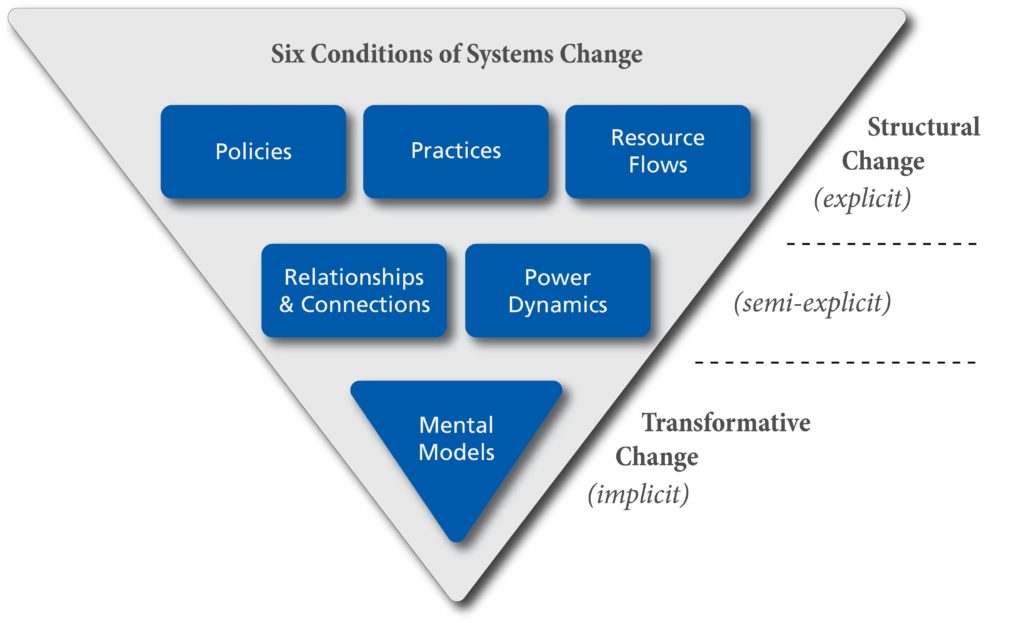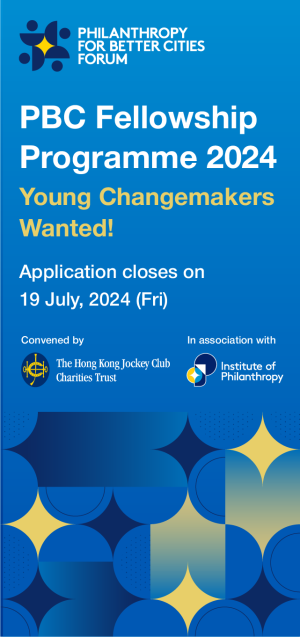Systems change has gained buzzword status over recent years, something that is discussed with earnest enthusiasm and exclamations of, ‘if we are ever going to see long-lasting and generational change, we need to change the system!’
But the reality is, for many foundations it is solely an aspirational outcome of their grant making rather than an ethos that permeates across their organisation. If a foundation is to be successful in creating changes within a system, it must do much more than just fund organisations purporting to do the systems change work.
One of the clearer definitions of systems change with a specific philanthropic lens is that from FSG, ‘Systems change is about advancing equity by shifting the conditions that hold a problem in place.’ They go on to present in their report, The Water of Systems Change an inverted triangle covering six interdependent conditions of systems change.
Quite rightly, the authors write that exploring these six conditions is not an outward facing exercise, foundations must also turn the lens internally and explore their own structures, processes and mindsets. But how many do?
It is not enough to examine internal policies, power dynamics and mental models on their own. First, foundations need to have mapped the system they are trying to impact and better understand and articulate their role within it. Only then can the six conditions of systems change be truly examined. To do this requires insight at a macro level, before diving into the particulars of how that might look.
For example, a foundation that may be aware of some systems change theory but their giving practices revolve solely around supporting causes of passion will have different frameworks than a foundation that is actively aware of systems change theory and is looking to create change via grant making and internal capability. It is important to note, that no matter what role a foundation plays at this macro level, all are relevant and important to the field of systems change. Systems, regardless of their focus, need multiple funding sources with different levels of engagement.
Some early work coming out of Australia and a 2018 retreat with the UK based Social Innovation Exchange looks at the broad roles philanthropy can play along the knowledge and capability systems change spectrum. With philanthropic support, these initial observations are currently being further researched and developed by The Australian Centre for Social Innovation.
Once a foundation has insight into the explicit function it plays via its knowledge and aspirations, it can then dive deeper into how it will resource different roles and its own capability to match.
Rachel Sinha and Tim Draimin published a map of the roles that they believe collectively build the field of systems change. When examining this list and their functions, it is easy to break the roles down into three categories:
- What is the role(s) our foundation can play?
- What is the role(s) our foundation can fund?
- What is the role(s) that will be uncovered/facilitated/nurtured as a result of our funding and practices?
How does a foundation resource capability into leadership acceleration, practice-based research or support individuals to be disruptors? Then, as this detailed exploration is being mapped out, it is useful to revisit the six conditions of systems change.
Systems change is difficult, it is messy and it is a long journey. But if philanthropy is going to have a successful tilt and shifting some of the systems around our most complex and pressing challenges, there is a large body of work that must be done by foundations in understanding their role and capability within these systems.
Stacey Thomas is Chief Executive Officer of the Fay Fuller Foundation






Comments (0)